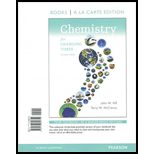
Interpretation: If ethyl alcohol (drinking alcohol) is poisonous or not should be explained.
Concept Introduction: Ethyl alcohol, is produced by the fermentation of yeast, sugars and starches that is added to beer, wine and liquor as an intoxicating agent. Foods products that produce this are grapes, barley, wheat, sugarcane.
Answer to Problem 1RQ
Solution: Drinking alcohol is often associated with liver damages and risk to cardiovascular diseases. Prolonged consumption of ethyl alcohol is seen to show changes in behavior like depression, anxiety, coordination impairment. Only small doses is found to bring in relaxed feelings and suppress anxiety. Hence, by consuming more than what the liver can
Explanation of Solution
Ethyl alcohol being soluble in water gets absorbed into the blood and distributes in the body, but its absorption decreases with intake of food rich in fats. The alcohol gets metabolized in the liver wherein the enzyme dehydrogenase converts alcohol to acetaldehyde. The acetaldehyde is sympathomimetic in nature which is said to give the ’hangover ‘effect. This acetaldehyde gets converted to acetic acid and further to carbon dioxide and water by the action hydrogenase enzyme. Hence, the person will tend to urinate frequently.
Alcohol also tends to reduce the signals to the nerves by elevating the inhibitory neurotransmitter −gamma amino butyric acid that lowers the cognitive and physical capabilities. In other words, it is termed as CNS depressant. But consuming more than 460 milligrams alcohol per 100 milliliters of blood can be lethal.
Excessive consumption of alcohol leads to alcohol dependence or alcoholism where the person displays symptoms like craving, loss of control, physical dependence, less tolerant.
Thus, drinking alcohol is often associated with liver damages and risk to cardiovascular diseases. Prolonged consumption of ethyl alcohol is seen to show changes in behavior like depression, anxiety, coordination impairment. Only small doses is found to bring in relaxed feelings and suppress anxiety. Hence, by consuming more than what the liver can metabolize, it leads to intoxication.
From the statements and facts, consuming alcohol is detrimental to health as it damages the liver and prevents its normal functioning. Besides, the person also gets cardiovascular illnesses that becomes lethal after specific period of consuming alcohol.
Want to see more full solutions like this?
Chapter 22 Solutions
Chemistry for the Changing Times, Books a la Carte Plus Mastering Chemistry with eText -- Access Card Package, 14th Edition
 ChemistryChemistryISBN:9781305957404Author:Steven S. Zumdahl, Susan A. Zumdahl, Donald J. DeCostePublisher:Cengage Learning
ChemistryChemistryISBN:9781305957404Author:Steven S. Zumdahl, Susan A. Zumdahl, Donald J. DeCostePublisher:Cengage Learning ChemistryChemistryISBN:9781259911156Author:Raymond Chang Dr., Jason Overby ProfessorPublisher:McGraw-Hill Education
ChemistryChemistryISBN:9781259911156Author:Raymond Chang Dr., Jason Overby ProfessorPublisher:McGraw-Hill Education Principles of Instrumental AnalysisChemistryISBN:9781305577213Author:Douglas A. Skoog, F. James Holler, Stanley R. CrouchPublisher:Cengage Learning
Principles of Instrumental AnalysisChemistryISBN:9781305577213Author:Douglas A. Skoog, F. James Holler, Stanley R. CrouchPublisher:Cengage Learning Organic ChemistryChemistryISBN:9780078021558Author:Janice Gorzynski Smith Dr.Publisher:McGraw-Hill Education
Organic ChemistryChemistryISBN:9780078021558Author:Janice Gorzynski Smith Dr.Publisher:McGraw-Hill Education Chemistry: Principles and ReactionsChemistryISBN:9781305079373Author:William L. Masterton, Cecile N. HurleyPublisher:Cengage Learning
Chemistry: Principles and ReactionsChemistryISBN:9781305079373Author:William L. Masterton, Cecile N. HurleyPublisher:Cengage Learning Elementary Principles of Chemical Processes, Bind...ChemistryISBN:9781118431221Author:Richard M. Felder, Ronald W. Rousseau, Lisa G. BullardPublisher:WILEY
Elementary Principles of Chemical Processes, Bind...ChemistryISBN:9781118431221Author:Richard M. Felder, Ronald W. Rousseau, Lisa G. BullardPublisher:WILEY





